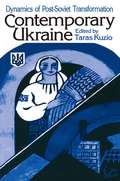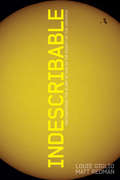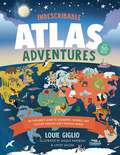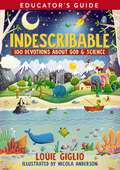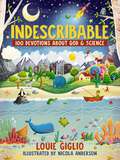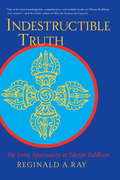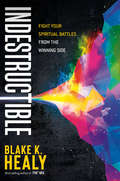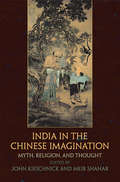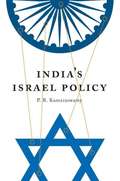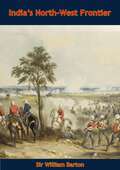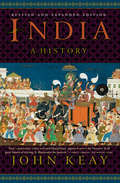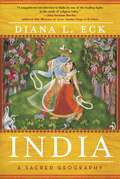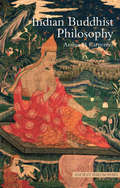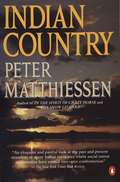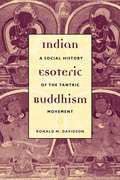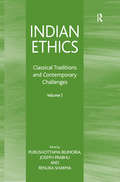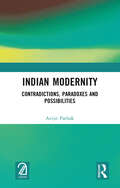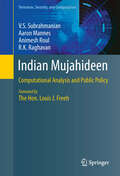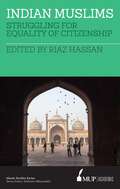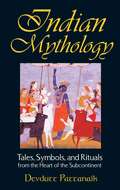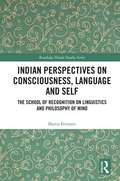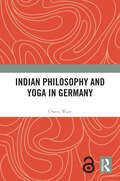- Table View
- List View
Independent Ukraine: Nation-state Building and Post-communist Transition
by Taras KuzioExploring the post-Communist transition that has taken place in the Ukraine, this text covers: nation and state building; national identity and regionalism; politics and civil society; economic transition; and security policy.
Indescribable
by Louie Giglio Matt RedmanPutting this powerful message into print for the first time, visionary pastor Louie Giglio and songwriter Matt Redman team up to write a heart-stirring book about the mysteries of God's creation. Indescribable takes readers on a journey through the vastness of outer space and into the depths of the soul. Modern science allows viewers to see farther into space than ever before, and every step draws them closer to the God who breathed each star into existence. In Indescribable, the authors intertwine devotional insights with remarkable scientific facts that awaken both mind and spirit. As Giglio and Redman write, God turnswonderers into worshipers. Above all, Indescribable is a call to worship--an invitation to know and be known by the God of all creation and to become more passionate worshipers of Jesus Christ.
Indescribable Atlas Adventures: An Explorer's Guide to Geography, Animals, and Cultures Through God's Amazing World (Indescribable Kids)
by Louie GiglioWith more than 50 infographic maps, this illustrated world atlas for kids from bestselling author Louie Giglio will stretch your children's understanding of the world as they discover more about God, science, and His amazing world!Indescribable Atlas Adventures offers a self-guided tour for your favorite explorer throughout the seven continents and over 50 countries. Easy-to-read maps, more than 1,500 facts, and a world map that helps kids identify each continent and country will help your child to think globally and discover new insights into God's incredible creation. Each map includesan overview of each country's population, languages, and prominent features;key facts about the country's capital cities; neighboring countries; and the national bird, tree, and dish;notable people and their amazing achievements;the country's terrain, climate, wildlife, contributions to space exploration, cultural hallmarks, and Christian faith traditions; andbiblical and inspirational pieces, like devotional thoughts, prayers, and Bible verses that highlight how amazing God and His world are.Indescribable Atlas Adventures is for ages 6 to 10 and spotlights several fascinating ecosystems, like the Sahara, Amazon, and Great Barrier Reef. This book has a large trim size to help kids explore fun details on each page and is a perfect "my first atlas of the world" gift for curious kids.Check out these other books from Pastor Louie's Indescribable Kids series, which has sold more than a million copies:IndescribableHow Great Is Our GodThe Wonder of CreationIndescribable for Little OnesIndescribable Activity Book for Kids
Indescribable Educator's Guide: 100 Indescribable Devotions About God And Science (Indescribable Kids)
by Louie GiglioIndescribable Educator's Guide is a companion to Indescribable by Louie Giglio. This guide can be utilized in the classroom, in a home school setting, or by parents seeking additional resources. Ideal for grades 3rd-5th.
Indescribable: 100 Devotions for Kids About God and Science (Indescribable Kids)
by Louie GiglioDiscover the Wonders of the Universe with the CreatorIt’s impossible to out-imagine God. He orchestrates time, creates light, and speaks things into existence—from the largest stars to the smallest starfish. God is a powerful, purposeful, personal, unparalleled Creator.Psalm 19:1 says, “The heavens tell the glory of God. And the skies announce what his hands have made.”Indescribable displays the majesty of creation with scientific findings, photography, and original illustrations. These 100 devotions encourage awe at God’s creativity with an in-depth look at • Space, Galaxies, Planets, and Stars• Earth, Geology, Oceans, and Weather• Animals—from Hummingbirds to Dinosaurs• Our Minds, Bodies, and Imaginations Each devotion features a “Be Amazed” section with fascinating facts, hands-on activities, and a closing prayer. Based on Louie Giglio’s popular messages “Indescribable” and “How Great Is Our God,” Indescribable: 100 Devotions About God & Science will help kids discover the incredible creation of our indescribable God.
Indestructible Truth: The Living Spirituality of Tibetan Buddhism
by Reginald A. RayIndestructible Truth is one of the most thorough introductions to the Tibetan Buddhist world view ever published; at the same time it is also one of the most accessible. The author presents complex and sophisticated teachings and practices in nontechnical language, using engaging stories and personal anecdotes to illustrate his points. Indestructible Truth presents Tibetan Buddhism in its traditional form but also shows how the Tibetan traditions are applicable to the problems and challenges of modern life in the West. In Indestructible Truth, Tibetan Buddhism is introduced not as an exotic religion, but rather as an expression of human spirituality that is having a profound impact on the modern world. In addition, it presents the point of view of meditation and the practice of the spiritual life, paying special attention to contemplative practice and meditation as taught in the Kagyu and Nyingma schools.
Indestructible Truth: The Living Spirituality of Tibetan Buddhism (Volume #1)
by Reginald A. RayAn introduction to Tibetan Buddhism
Indestructible: Fight Your Spiritual Battles From the Winning Side
by Blake K. HealyFROM BEST-SELLING AUTHOR OF THE VEIL Learn about angels and demons from a man who can see them. This book will teach you how to battle your spiritual struggles from the winning side so that you can be victorious both in your life and in the issues happening in today&’s world. Many Christians limp through their lives feeling beat up by the enemy, their circumstances, and internal strife. They look at the pattern of world events with a sense of hopelessness. Too often they simply accept these as the natural trials and challenges of life. However, other Christians acknowledge that there is a war happening, a battle between angels and demons. They want to know: What are the rules of engagement for this battle? What weapons do we have? What kind of enemy are we facing? Is this battle always happening, or are there moments of rest and peace? Am I really meant to fight in a battle where I can&’t see my enemies or my allies? Blake Healy has seen angels and demons since he was a small child. In this book readers will discover what Healy has learned about the nature of spiritual warfare after over thirty years of seeing in the spirit. They will learn the truth about how they can be victorious in both their personal battles and the battles that are happening in the world. And they will see how they can truly feel as if they are fighting their spiritual battles from the winning side. This book will Teach readers how to posture their hearts and minds for personal spiritual battles as well as global spiritual warfareShow readers how to live from the victory Jesus won on the crossGive readers insight into the nature of spiritual warfare—how we fight, what winning looks like, our authority as Christians, and how much power the enemy hasIndestructible will show readers how to have complete victory in their daily spiritual battles and join the front lines as heaven invades earth.FEATURES AND BENEFITS:Blake&’s remarkable stories of seeing in the spiritThought exercises to help readers identify the difference between thinking in an earthly context and thinking in a heavenly contextExercises designed to help awaken dreams that may have been shut down or have gone unrecognized and to show readers how to pursue those dreams with the Holy Spirit as their guideActivations and meditations at the end of each chapter to help readers implement the principlesOTHER BOOKS BY BLAKE HEALY:Profound Good (2019) ISBN: 978-1629995656The Veil (2018) ISBN: 978-1629994901
India and the Islamic Heartlands
by Sood Gagan D. S."Based on the chance survival of a remarkable cache of documents, India and the Islamic Heartlands recaptures a vanished and forgotten world from the eighteenth century spanning much of today's Middle East and South Asia. Gagan Sood focuses on ordinary people--traders, pilgrims, bankers, clerics, brokers, scribes, among others--who were engaged in activities marked by large distances and long silences. By elucidating their everyday lives in a range of settings, from the family household to the polity at large, Sood pieces together the connective tissue of a world that lay beyond the sovereign purview. Recapturing this obscured and neglected world helps us better understand the region during a pivotal moment in its history, and offers new answers to old questions concerning early modern Eurasia and its transition to colonialism"--
India in the Chinese Imagination: Myth, Religion, and Thought (Encounters with Asia)
by John Kieschnick Meir ShaharIndia and China dominate the Asian continent but are separated by formidable geographic barriers and language differences. For many centuries, most of the information that passed between the two lands came through Silk Route intermediaries in lieu of first-person encounters—leaving considerable room for invention. From their introduction to Indian culture in the first centuries C.E., Chinese thinkers, writers, artists, and architects imitated India within their own borders, giving Indian images and ideas new forms and adapting them to their own culture. Yet India's impact on China has not been greatly researched or well understood.India in the Chinese Imagination takes a new look at the ways the Chinese embedded India in diverse artifacts of Chinese religious, cultural, artistic, and material life in the premodern era. Leading Asian studies scholars explore the place of Indian myths and storytelling in Chinese literature, how Chinese authors integrated Indian history into their conception of the political and religious past, and the philosophical relationships between Indian Buddhism, Chinese Buddhism, and Daoism. This multifaceted volume, illustrated with over a dozen works of art, reveals the depth and subtlety of the encounter between India and China, shedding light on what it means to imagine another culture—and why it matters.Contributors: Stephen R. Bokenkamp, Bernard Faure, John Kieschnick, Victor H. Mair, John R. McRae, Christine Mollier, Meir Shahar, Robert H. Sharf, Nobuyoshi Yamabe, Ye Derong, Shi Zhiru.
India's Israel Policy
by P. R. KumaraswamyIndia's foreign policy toward Israel is a subject of deep dispute. Throughout the twentieth century arguments have raged over the Palestinian problem and the future of bilateral relations. Yet no text comprehensively looks at the attitudes and policies of India toward Israel, especially their development in conjunction with history. P. R. Kumaraswamy is the first to account for India's Israel policy, revealing surprising inconsistencies in positions taken by the country's leaders, such as Mahatma Gandhi and Jawaharlal Nehru, and tracing the crackling tensions between its professed values and realpolitik. Kumaraswamy's findings debunk the belief that India possesses a homogenous policy toward the Middle East. In fact, since the early days of independence, many within India have supported and pursued relations with Israel. Using material derived from archives in both India and Israel, Kumaraswamy investigates the factors that have hindered relations between these two countries despite their numerous commonalities. He also considers how India destabilized relations, the actions that were necessary for normalization to occur, and the directions bilateral relations may take in the future. In his most provocative argument, Kumaraswamy underscores the disproportionate affect of anticolonial sentiments and the Muslim minority on shaping Indian policy.
India's North-West Frontier
by Sir William BartonSir William Pell Barton KCIE CSI (29 May 1871 – 28 November 1956) had a distinguished career in the Indian Political Service. He was British Resident in Baroda (1919), Mysore (1920–25) and Hyderabad (1925–30) and was well known as an authority on the North West Frontier and the Princely states during the days of British rule in India. On leaving the service he worked as an historian of the Princely states and was a frequent contributor to periodicals on issues concerning India and Pakistan.In 1893 he passed the Indian Civil Service examinations and left England for the Punjab. He was head of several administered districts in the North West Frontier and would later move to the Indian Political Service initially as Political Agent in the Princely states of Dir, Swat and Chitral.In 1911, Barton was made secretary to Sir George Roos-Keppel, then Chief Commissioner of the North West Frontier. By 1915 he was Judicial Commissioner of the North West Frontier and was briefly British Resident in Baroda in 1919 before returning to the Frontier where he undertook political service in the short Afghan War and became Chief Political Agent with the Waziristan Field Force.Between 1920 and 1925, Barton was British Resident in Mysore and Chief Commissioner of Coorg. In 1925 he was made British Resident in Hyderabad, during which time he further established good relationships in the Princely states and was on good terms with Sir Akbar Hydari. His obituary in The Times states that ‘In all these capacities his quiet manner and innate kindness were linked with discriminating judgment and strength of purpose’.Barton was made a Knight Commander in the Order of the Indian Empire in 1927.
India: A History
by John KeayFully revised with forty thousand new words that take the reader up to present-day India, John Keay’s India: A History spans five millennia in a sweeping narrative that tells the story of the peoples of the subcontinent, from their ancient beginnings in the valley of the Indus to the events in the region today. In charting the evolution of the rich tapestry of cultures, religions, and peoples that comprise the modern nations of Pakistan, India, and Bangladesh, Keay weaves together insights from a variety of scholarly fields to create a rich historical narrative. Wide-ranging and authoritative, India: A History is a compelling epic portrait of one of the world’s oldest and most richly diverse civilizations.
India: A Sacred Geography
by Diana L EckIn India: A Sacred Geography, renowned Harvard scholar Diana Eck offers an extraordinary spiritual journey through the pilgrimage places of the world's most religiously vibrant culture and reveals that it is, in fact, through these sacred pilgrimages that India's very sense of nation has emerged. No matter where one goes in India, one will find a landscape in which mountains, rivers, forests, and villages are elaborately linked to the stories of the gods and heroes of Indian culture. Every place in this vast landscape has its story, and conversely, every story of Hindu myth and legend has its place. Likewise, these places are inextricably tied to one another--not simply in the past, but in the present--through the local, regional, and transregional practices of pilgrimage. India: A Sacred Geography tells the story of the pilgrim's India. In these pages, Diana Eck takes the reader on an extraordinary spiritual journey through the living landscape of this fascinating country -its mountains, rivers, and seacoasts, its ancient and powerful temples and shrines. Seeking to fully understand the sacred places of pilgrimage from the ground up, with their stories, connections and layers of meaning, she acutely examines Hindu religious ideas and narratives and shows how they have been deeply inscribed in the land itself. Ultimately, Eck shows us that from these networks of pilgrimage places, India's very sense of region and nation has emerged. This is the astonishing and fascinating picture of a land linked for centuries not by the power of kings and governments, but by the footsteps of pilgrims. India: A Sacred Geography offers a unique perspective on India, both as a complex religious culture and as a nation. Based on her extensive knowledge and her many decades of wide-ranging travel and research, Eck's piercing insights and a sweeping grasp of history ensure that this work will be in demand for many years to come.
Indian Buddhist Philosophy (Ancient Philosophies)
by Amber CarpenterOrganised in broadly chronological terms, this book presents the philosophical arguments of the great Indian Buddhist philosophers of the fifth century BCE to the eighth century CE. Each chapter examines their core ethical, metaphysical and epistemological views as well as the distinctive area of Buddhist ethics that we call today moral psychology. Throughout, this book follows three key themes that both tie the tradition together and are the focus for most critical dialogue: the idea of anatman or no-self, the appearance/reality distinction and the moral aim, or ideal. Indian Buddhist philosophy is shown to be a remarkably rich tradition that deserves much wider engagement from European philosophy. Carpenter shows that while we should recognise the differences and distances between Indian and European philosophy, its driving questions and key conceptions, we must resist the temptation to find in Indian Buddhist philosophy, some Other, something foreign, self-contained and quite detached from anything familiar. Indian Buddhism is shown to be a way of looking at the world that shares many of the features of European philosophy and considers themes central to philosophy understood in the European tradition.
Indian Country
by Peter MatthiessenAfter winning an eight year legal battle, here is the controversial book that powerfully sheds new light on the plight of Native Americans. Matthiessen's urgent accounts and absorbing journalistic details make it impossible to ignore the message they so eloquently proclaim.
Indian Esoteric Buddhism: A Social History of the Tantric Movement
by Ronald DavidsonThis groundbreaking work describes the historical origins of the Tantric movement in early medieval India. Drawing on primary documents--translated into English for the first time from Sanskrit, Prakrit, and Bengali--Davidson shows how changes in medieval Indian society, including economic and patronage crises, a decline in women's participation, and the formation of large monastic orders, led to the rise of the esoteric tradition in India that became the model for Buddhist cultures in China, Tibet, and Japan.
Indian Esoteric Buddhism: A Social History of the Tantric Movement
by Ronald DavidsonDespite the rapid spread of Buddhism—especially the esoteric system of Tantra, one of its most popular yet most misunderstood forms—the historical origins of Buddhist thought and practice remain obscure. This groundbreaking work describes the genesis of the Tantric movement in early medieval India, where it developed as a response to, and in some ways an example of, the feudalization of Indian society. Drawing on primary documents—many translated for the first time—from Sanskrit, Prakrit, Tibetan, Bengali, and Chinese, Ronald Davidson shows how changes in medieval Indian society, including economic and patronage crises, a decline in women's participation, and the formation of large monastic orders, led to the rise of the esoteric tradition in India that became the model for Buddhist cultures in China, Tibet, and Japan.
Indian Ethics: Classical Traditions and Contemporary Challenges: Volume I
by Purushottama Bilimoria Renuka Sharma Joseph PrabhuIndian ethics is one of the great traditions of moral thought in world philosophy whose insights have influenced thinkers in early Greece, Europe, Asia, and the New World. This is the first such systematic study of the spectrum of moral reflections from India, engaging a critical cross-cultural perspective and attending to modern secular sensibilities. The volume explores the scope and limits of Indian ethical thinking, reflecting on the interpretation and application of its teachings and practices in the comparative and contemporary contexts. The chapters chart orthodox and heterodox debates, from early classical Hindu texts to Buddhist, Jaina, Yoga, and Gandhian ethics. The range of issues includes: life-values and virtues, karma and dharma, evil and suffering, renunciation and enlightenment; and extends to questions of human rights and justice, ecology and animal ethics, nonviolence and democracy. Ramifications for rethinking ethics in a postmodern and global era are also explored. Indian Ethics offers an invaluable resource for students of philosophy, religion, human sciences and cultural studies, and to those interested in South Asian responses to moral dilemmas in the postcolonial era.
Indian Modernity: Contradictions, Paradoxes and Possibilities
by Avijit PathakIndian Modernity (first published in 1998) acquires a new meaning today. While it critiques a techno-militaristic model of modernization, it visualizes alternative possibilities to give a distinctively new definition to our modernity. It engages the reader in dreaming of a new path to modernity beyond its present contradictions and paradoxes with its lyrical style, philosophic insights, sensitivity to deep religiosity, life-affirming femininity and, most of all, sociological imagination. This book continues to hold relevance for social science students and researchers, teachers, and visionaries, despite the passage of time. This title is co-published with Aakar Books. Print editions not for sale in South Asia (India, Sri Lanka, Nepal, Bangladesh, Pakistan and Bhutan)
Indian Mujahideen
by V. S. Subrahmanian Aaron Mannes Animesh Roul R. K. RaghavanAdvance Praise for Indian Mujahideen: Computational Analysis and Public Policy "This book presents a highly innovative computational approach to analyzing the strategic behavior of terrorist groups and formulating counter-terrorism policies. It would be very useful for international security analysts and policymakers. " Uzi Arad, National Security Advisor to the Prime Minister of Israel and Head, Israel National Security Council (2009-2011) "An important book on a complex security problem. Issues have been analysed in depth based on quality research. Insightful and well-balanced in describing the way forward. " Naresh Chandra, Indian Ambassador to the USA (1996-2001) and Cabinet Secretary (1990-1992). "An objective and clinical account of the origins, aims, extra-territorial links and modus-operandi, of a growingly dangerous terrorist organization that challenges the federal, democratic, secular and pluralistic ethos of India's polity. The authors have meticulously researched and analysed the multi-faceted challenges that the "Indian Mujahideen" poses and realistically dwelt on the ways in which these challenges could be faced and overcome. " G. Parthasarathy, High Commissioner of India to Australia (1995-1998) and Pakistan (1998-2000). This book provides the first in-depth look at how advanced mathematics and modern computing technology can influence insights on analysis and policies directed at the Indian Mujahideen (IM) terrorist group. The book also summarizes how the IM group is committed to the destabilization of India by leveraging links with other terror groups such as Lashkar-e-Taiba, and through support from the Pakistani Government and Pakistan's intelligence service. Foreword by The Hon. Louis J. Freeh.
Indian Muslims: Struggling for Equality of Citizenship (Islamic Studies Series)
by Riaz HassanResearch shows that Indian Muslims experience higher levels of development and equity deficits. Indian Muslims are also predicted to become the largest Muslim population in the world by 2050. This increase in numbers might exacerbate their relative deprivation, creating a disjunction between India's constitutional promises of 'equality of opportunity' for citizens of a secular democracy—including for minorities—and the existential reality. This will create social and political conditions that could undermine the stability of the country's democracy and make Indian Muslims a security threat, which would have not only national but also global ramifications. This book examines the struggle for equality of citizenship of Indian Muslims in light of the release of the Sachar Committee report of 2006, which sparked widespread awareness of socioeconomic disparity and exclusion of religious minorities in India, especially Muslims. The contributors are some of the most eminent social scientists in the fields of applied economics, politics, sociology and demography who work on Indian issues. The Indian state and its political infrastructure have been relatively successful thus far in countering the challenges presented by the diversity of its population. India therefore has the capacity and the ability to deal with these new challenges, given the political and collective will. Islamic Studies Series - Volume 22
Indian Mythology: Tales, Symbols, and Rituals from the Heart of the Subcontinent
by Devdutt PattanaikAn exploration of 99 classic myths of India from an entirely non-Western paradigm that provides a fresh understanding of the Hindu spiritual landscape• Compares and contrasts Indian mythology with the stories of the Bible, ancient Egypt, Greece, Scandinavia, and Mesopotamia• Looks at the evolution of Indian narratives and their interpretations over the millennia• Demonstrates how the mythology, rituals, and art of ancient India are still vibrant today and inform the contemporary generationFrom the blood-letting Kali to the mysterious Ganesha, the Hindu spiritual landscape is populated by characters that find no parallel in the Western spiritual world. Indian Mythology explores the rich tapestry of these characters within 99 classic myths, showing that the mythological world of India can be best understood when we move away from a Western, monotheistic mindset and into the polytheistic world of Hindu traditions.Featuring 48 artistic renderings of important mythological figures from across India, the author unlocks the mysteries of the narratives, rituals, and artwork of ancient India to reveal the tension between world-affirming and world-rejecting ideas, between conformism and contradiction, between Shiva and Vishnu, Krishna and Rama, Gauri and Kali. This groundbreaking book opens the door to the unknown and exotic, providing a glimpse into the rich mythic tradition that has empowered millions of human beings for centuries.
Indian Perspectives on Consciousness, Language and Self: The School of Recognition on Linguistics and Philosophy of Mind (Routledge Hindu Studies Series)
by Marco FerranteThis book examines the theory of consciousness developed by the school of Recognition, an Indian philosophical tradition that thrived around the tenth c. CE in Kashmir, and argues that consciousness has a linguistic nature. It situates the doctrines of the tradition within the broader Indian philosophical context and establishes connections with the contemporary analytic debate. The book focuses on Utpaladeva and Abhinavagupta (tenth c. CE), two Hindu intellectuals belonging to the school of Recognition, Pratyabhijñā in Sanskrit. It argues that these authors promoted ideas that bear a strong resemblance with contemporary ‘higher–order theories’ of consciousness. In addition, the book explores the relationship between the thinkers of the school of Recognition and the thought of the grammarian/philosopher Bhartṛhari (fifth c. CE). The book bridges a gap that still exists between scholars engaged with Western traditions and Sanskrit specialists focused on textual materials. In doing so, the author uses concepts from contemporary philosophy of mind to illustrate the Indian arguments and an interdisciplinary approach with abundant reference to the original sources. Offering fresh information to historians of Indian thought, the book will also be of interest to academics working on Non-Western Philosophy, Comparative Philosophy, Indian Philosophy, Religion, Hinduism, Tantric Studies and South Asian Studies.
Indian Philosophy and Yoga in Germany
by Owen WareThis book sheds new light on the fascinating – at times dark and at times hopeful – reception of classical Yoga philosophies in Germany during the nineteenth century. When debates over God, religion, and morality were at a boiling point in Europe, Sanskrit translations of classical Indian thought became available for the first time. Almost overnight India became the centre of a major controversy concerning the origins of western religious and intellectual culture. Working forward from this controversy, this book examines how early translations of works such as the Bhagavad Gītā and the Yoga Sūtras were caught in the crossfire of another debate concerning the rise of pantheism, as a doctrine that identifies God and nature. It shows how these theological concerns shaped the image of Indian thought in the work of Schlegel, Gunderrode, Humboldt, Hegel, Schelling, and others, lasting into the nineteenth century and beyond. Furthermore, this book explores how worries about the perceived nihilism of Yoga were addressed by key voices in the early twentieth century Indian Renaissance – notably Dasgupta, Radhakrishnan, and Bhattacharyya – who defended sophisticated counterreadings of their intellectual heritage during the colonial era. Written for non-specialists, Indian Philosophy and Yoga in Germany will be of interest to students and scholars working on nineteenth-century philosophy, Indian philosophy, comparative philosophy, Hindu studies, intellectual history, and religious history.
